-
Intelligence makes for better leaders —from undergraduates to managers to presidents — according to multiple studies. It certainly makes sense that handling a market shift or anything alike require intelligence. But new research on leadership suggests that, at a certain point, having a higher IQ stops helping and starts hurting.
Although previous research has shown that groups with smarter leaders perform better by objective measures, some studies have suggested that followers might subjectively view leaders with extremely high intellect as less effective. Decades ago, Dean Simonton, a psychologist from the University of California, Davis, proposed that brilliant leaders' words may simply go over people's heads, their solutions could be more complicated to carry out and followers might find it harder to relate to them. Now Simonton and two colleagues have finally tested that idea, publishing their results in the July 2017 issue of the Journal of Applied Psychology.
The researchers looked at 379 male and female business leaders in 30 countries across fields including banking, retail and technology. The managers took IQ tests and each was rated on leadership style and effectiveness by an average of eight co-workers. IQ positively correlated (和......正相关)with ratings of leader effectiveness, strategy formation, vision and several other characteristics—up to a point. The ratings peaked at an IQ of around 120, which is higher than roughly 80 percent of office workers. Beyond that, the ratings declined. The researchers suggest the "ideal" IQ could be higher or lower in various fields, to 140 or 100, depending on whether technical or social skills are more valued in a given work culture.
"It's an interesting and thoughtful paper,” says Paul Sackett, a management professor at University of Minnesota, who was not involved in the research. “To me, the right interpretation of the work would be that it highlights a need to understand what high-IQ leaders do that leads to lower understanding by followers,” he says. “The wrong interpretation would be, “Don’t hire high-IQ leaders.'"
The study’s lead author, John Antonakis, a psychologist at the University of Lausanne in Switzerland, suggests leaders should use their intelligence to use creative language that will persuade and inspire others—the way former U.S. President Barack Obama did. "I think the only way a smart person can signal their intelligence properly and still connect with the people,” Antonakis says, "is to speak in charming ways."
1.The reason why those with high IQs are viewed as worse leaders is probably that .
A.followers think of their leaders to be less effective
B.their IQ has a positive correlation with leader effectiveness
C.they are hard to get their schemes across to followers
D.their social skills can't be recognized in some work culture
2.Which of the following graphs shows the correct relationship between IQ points and leadership qualities?
A. B.
B.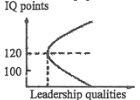
C. D.
D.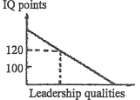
3.To improve their leadership, high-IQ leaders can.
A.interpret the work they are involved in
B.use inspiring and accessible language
C.take a course in leader effectiveness
D.communicate more with their followers
4.What could be the best title for the passage?
A.A way to success for high-IQ leaders
B.The latest research on intelligence
C.Choose to be a leader of low intelligence
D.Does a high IQ advance your leadership
-
Intelligence makes for better leaders —from undergraduates to managers to presidents — according to multiple studies. It certainly makes sense that handling a market shift or anything alike requires intelligence. But new research on leadership suggests that, at a certain point, having a higher IQ stops helping and starts hurting.
Although previous research has shown that groups with smarter leaders perform better by objective measures, some studies have suggested that followers might subjectively view leaders with extremely high intellect as less effective. Decades ago, Dean Simonton, a psychologist from the University of California, Davis, proposed that brilliant leaders’ words may simply go over people’s heads, their solutions could be more complicated to carry out and followers might find it harder to relate to them. Now Simonton and two colleagues have finally tested that idea, publishing their results in the July 2017 issue of the Journal of Applied Psychology.
The researchers looked at 379 male and female business leaders in 30 countries across fields including banking, retail and technology. The managers took IQ tests and each was rated on leadership style and effectiveness by an average of eight co-workers. IQ positively correlated (和......正相关)with ratings of leader effectiveness, strategy formation, vision and several other characteristics—up to a point. The ratings peaked at an IQ of around 120, which is higher than roughly 80 percent of office workers. Beyond that, the ratings declined(降低).
The researchers suggest the “ideal” IQ could be higher or lower in various fields, to 140 or 100, depending on whether technical or social skills are more valued in a given work culture.
“It’s an interesting and thoughtful paper,” says Paul Sackett, a management professor at University of Minnesota, who was not involved in the research. “To me, the right interpretation of the work would be that it highlights a need to understand what high-IQ leaders do leads to lower understanding by followers,” he says. “The wrong interpretation would be, “Don’t hire high-IQ leaders.”
The study’s lead author, John Antonakis, a psychologist at the University of Lausanne in Switzerland, suggests leaders should use their intelligence to use creative language that will persuade and inspire others—the way former U.S. President Barack Obama did. “I think the only way a smart person can signal their intelligence properly and still connect with the people,” Antonakis says, “is to speak in charming ways.”
1.The reason why those with high IQs are viewed as worse leaders is probably that _______.
A.followers think of their leaders to be less effective
B.it is hard for them to get their plans across to followers
C.their IQ has a positive correlation with leader effectiveness
D.their social skills can’t be recognized in some work culture
2.Which of the following graphs shows the correct relationship between IQ points and leadership qualities?
A.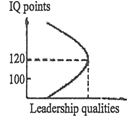 B.
B.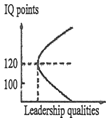
C.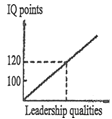 D.
D.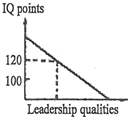
3.To improve their leadership, high-IQ leaders can _______.
A.use inspiring and accessible language B.interpret the work they are involved in
C.take a course in leader effectiveness D.communicate more with their followers
4.What is Paul Sackett’s attitude towards hiring high-IQ leaders?
A.Unconcerned. B.Positive. C.Doubtful. D.Unclear.
5.What could be the best title for the passage?
A.A Way to Success for High-IQ Leaders.
B.The Latest Research on Intelligence.
C.Does a High IQ Advance Your Leadership?
D.Choose to be a Leader of Low Intelligence.
-
Emotional intelligence helps us to better understand ourselves and others. It can help us make better decisions, ones that are in harmony with our true beliefs and values. But what does emotional intelligence look like in real life? In EQ Applied: The Real-World Guide to Emotional Intelligence, the author expresses his opinion on that.1.Take a look, and see whether they describe your everyday habits.
You take your time.
You know that emotions and feelings are temporary and that making sudden decisions leads to regrets.2.
You praise.
You look for the good in others. When you find it, you tell them what you appreciate and why. In doing so, you lift others up and bring out the best in them.
3.
Nowadays, people often fail to keep an appointment-from a handshake deal to weekend plans. But you'd better try to keep your word in things big and small- and that helps build your reputation as both reliable and trustworthy.
You say sorry.
You're not afraid to apologize when you mess up. Sometimes, you even apologize when you're right because you value your relationship.
You forgive and forget.
4.And if they refuse, you move on anyway-and prevent others from holding your emotions hostage.
You learn from mistakes.
No one can perfectly manage their emotions. But you work hard to learn from those mistakes-to study your own behavior and identify your triggers(起因).5.
A.You show gratitude.
B.You stick to your word.
C.You are always willing to learn from others.
D.Here are some of the characteristics that accompany a high EQ.
E.When others apologize, you put it behind you and never bring it up again.
F.Meanwhile you build habits that will help you handle those situations better the next time.
G.That's why you pause before speaking or acting, especially when you recognize you're not calm.
-
Anyone can try to lead a group, but not every individual(个人) is cut for leadership.The better leaders possess a few qualities that can mean the difference between the success and failure of the group.These are the qualities the leader of higher rank will look for when choosing a leader for a group or when evaluating the performance of a leader. They're also the qualities team member want in a group leader, and appreciate when they find them.
Take Responsibility
Group leaders might share tasks around a group as necessary, but eventually a group leader needs to be able to accept that responsibility lies on her shoulders.That means that if things go wrong in a group project, she's the one who must accept the consequences and work out what mistakes were made.The group leader won't always have the power to control everything group member do, but she should be ready to admit any mistake the group has made as a result of her leadership.
Concern for Members
The group leader has a commitment to the task or project at hand, but perhaps more importantly,he has a real concern for each and every person who is part of his group. This means getting to know the strengths, weaknesses and goals of team member, as well as making time to build the group through collective(集体的) activities.The group leader should make sure that everyone is include, even if an individual is new to a group.
Good listener
The group leader needs to be able to listen to the suggestions, complains(抱怨)and ideas of group member. Not only will this allow complaints to be spoken up and potentially suitable ideas to be put into practice, but a leader who listens will also encourage group members to share their concerns and thoughts, creating an atmosphere of free speech and productivity.
1.The passage is mainly about ________.
A. choosing a good leader for a group
B. assessing the performance of a leader
C. qualities of a good group leader
D. team members' appreciation of a leader
2.A good leader should always be able to ________.
A.tell when things go wrong in a group project
B.control everything group members do
C.make group members admit their mistakes
D.recognize any mistakes as his own
3.According to "Concerns for members", which of the following is a good quality of a leader?
A. Fair. B. Reliable. C. Determined. D. Generous.
-
Artificial Intelligence (AI) is making it possible for companies to monitor workers’ behavior in great detail and in real time. Start to slack off (懈怠), and AI could talk to your boss.
One company offering such services is London-based start-up Status Today. Its AI platform relies on a regular supply of employee data, including everything from the files you access to when you use a key card. From this, it builds a picture of how employees normally function and signals any unusual performance. The idea is to spot when someone might become a security risk by doing something different from their usual behavioral patterns. “All of this gives us fingerprint of a user, so if we think the fingerprint doesn’t match, we raise a warning”, says Mircea Dumitrescu, the company’s chief technology officer.
The system also aims to catch employee actions that could accidentally cause a security breach (漏洞), like opening malware (恶意软件).“We’re not monitoring if your computer has a virus.” says Dumitrescu. “We’re monitoring human behaviors.”
But catching the security breach means monitoring everyone, and the AI can also be used to track employee productivity. “It seems like they are just using the reputation of AI to give an air of lawfulness to old-fashioned workplace surveillance (监视),” says Javier Ruiz Diaz of digital campaigning organization the Open Rights Group. “You have a right to privacy and you shouldn’t be expected to give that up at work.”
Exactly how companies use the system will be up to them, but it’s hard to shake the picture of an AI constantly looking over employees’ shoulders. “It will bother people, and that could be counterproductive if it affects their behavior,” says Paul Bemal at the University of East Anglia.
Phil Legg at the University of the West of England says it will never catch every security risk. “If people know they’re being monitored, they can change their behavior,” he says.
1.According to the text, AI monitors employees by ________.
A. taking pictures of them B. getting access to their data
C. signaling their usual performance D. catching their actions
2.What’s Javier Ruiz Diaz’s attitude towards the system?
A. Doubtful. B. Supportive.
C. Uncaring. D. Negative.
3.What does the underlined word “that” in paragraph 4 refer to?
A. Security breach. B. Employees’ productivity.
C. The right to privacy. D. Workplace surveillance.
4.Phil Legg’s concern about the system suggests that ________.
A. it is too risky to be used at work
B. it will affect employees’ emotions
C. it may not be so effective as expected
D. it will encourage employee, productivity
-
You’d better make the plants shorter, ______ they will interrupt the views from the house.
A. but B. and C. so D. or
-
Cultural exchange ________ better understanding.
| A.makes for | B.looks for | C.takes for | D.sends for |
-
They say chocolate makes everything better, and apparently wagyu beef is no exception. For the past 10 years, the Mayura Station Farm in southern Australia has been feeding its wagyu cattle chocolate and other sweets mixed with their regular feed, and the results have been shocking.
When Scott de Bruin, managing partner at Mayura Station, returned to his father's farm in the Limestone coast of Australia, in 1998, he knew he wanted to do something special to make their beef stand out. But he didn't know exactly how he was going to do that, so he consulted a cattle nutrition specialist from Japan and spent two years experimenting with different feed before deciding on the final daily ration(配给量) for his wagyu cows – a special mix of regular feed, chocolate, gummy bears, strawberries and cream flavored gummy snakes. Each cow eats up to 2 kilograms of ground and partially broken chocolate delivered by Cadbury's every day.
Adding chocolate to the daily diet of cows at Mayura Station started out as a simple experiment, but it ended up making their luxury beef one of the most appreciated in the world. “Many of my customers come to enjoy Mayura beef two to three times a week. They love how the beef has the perfect balance of fat, rich flavor and tender texture(质地),” Michelin star chef Umberto Bombana told Forbes Magazine.
Shane Osborn, Head Chef and Co-Owner of Arcane Restaurant in Hong Kong, added that its unique sweetness, hint of nuttiness and buttery texture make Mayura beef “the ultimate steak”.
Asked if the milk chocolate has a negative effect on the cattle's health, Scott de Bruin says “No, unlike humans – who may start eating chocolates at a very young age for over several decades – these cattle (raised on chocolates for only four months) won't see the long-term negative effects of chocolates in their system.”
As you can imagine, Mayura luxury beef is not cheap. Forbes reports that a 10.5oz-steak sells for $288, but those who can afford it claim it's worth every penny.
1.What is the purpose of the first paragraph?
A. To promote the act. B. To present happiness.
C. To show the author’s shock D. To introduce the topic.
2.What did Bruin do after returning to his father’s farm in 1998?
A. He began to work hard. B. He started to do research.
C. He came to learn about cows. D. He worked for a Japanese specialist.
3.Why did many customers come to enjoy Mayura beef frequently?
A. Because his service is the first class.
B. Because the price of beef is rather low.
C. Because his beef tastes good and nutritious.
D. Because his advertisement is fairly good.
4.What does Bruin think of the influence of the milk chocolate on cattle?
A. It has no bad influence in the long term. B. It has long-term effects.
C. It has short-term effects. D. It makes him puzzled.
-
Women make better drivers than men for many reasons. Why is that? Wouldn't you think that competing at who has better driving abilities is pointless? If you ask me, I'd like to say, men know that women are better drivers but do not have the courage to admit the truth.
Unlike men, women stop for directions when they have no idea where they are going. Women don't drive around for hours pointlessly wasting a tank of gas only to find themselves heading in the wrong direction. Have you ever been in a car with a man who is lost? He tells you to shut up when you begin to open your mouth. And every five minutes or so he takes a turn going forty-five miles per hour only to find out he's made another wrong turn.
Speeding is what men do best on the road. Traffic is not a race. There is a reason why men get more speeding tickets than women. Not because women trick to get out of tickets but only because they don't speed. Women don't risk putting their own lives and the lives of others in danger. In other words ,they have more responsibility for life.
My largest issue with male drivers is how a majority of them drive with one hand on the wheel and the other hand doing only God knows what. The seat is backed as far as possible. They're totally lost in loud music beyond a necessary level. You don't ever see women driving like that.
I feel that the above evidence more than proves my points that women are queens of the road. Oh ,men, if you want to continue criticizing women for being bad drivers, bring it on. We know you lack confidence, or else you wouldn't be wasting your valuable time making jokes about the ones you may choose to spend the rest of your days with.
1.Who does the author think are the better drivers? (no more than 1 word)
2.When will women drivers stop to ask for help? (no more than 9 words)
3.Why do men get more speeding tickets? (no more than 3 words)
4.What quality do women drivers have when it comes to safety? (no more than 3 words)
5.How is the seat backed by most male drivers? (no more than 4 words)
-
Surfing the Internet for fun will make you a better employee,according to an Australian study.
The University of Melbourne study shows that people who use the Internet for their own reasons at work are about 9 percent more productive than those who do not. Study author brent Coker said“Surfing the Internet at times helps increase an employee’s attention.”
“People need to relax for a bit to get back their attention,”Coker said on the university’s website.”Having a short break, such as a quick surfing of the Internet, helps the mind to rest itself,leading to a higher total Internet attention for a day’s work, and as a result, increase productivity(生产效率),”he said.
According to the study of 300 workers ,70 percent of people who use the Internet at work surf the Internet for their own reasons during office hours. Among the most popular surfing activities are searching for information about products, reading online news, playing online games and watching videos.”Firms spend a lot of money on software to block their employees from watching video, using social networking sites or shopping online, ”said Coker.”that’s not always a good idea.”
However, Coker said the study looked at people who surfed the Internet in moderation(),or were on the Internet for lee than 20 percent of their total time in the office.”Those who spend too much time surfing the Internet will have a lower productivity than those without,”he said.
1.What does the University of Melbourne study mainly show?
A. People who surf the Internet are good employees.
B. Not everyone surfs the Internet for fun during office hours.
C. Surfing the Internet for fun during office hours increase productivity.
D. The Internet is becoming more and more important in people’s life.
2.According to paragraph 3,Brent Coker would most probably agree that ________.
A. the longer a person’s mind rests the better attention he will have.
B. surfing the Internet is the best way to increase productivity.
C. workers should have a long break during office hours
D. workers should let their minds rest now and then.
3.Which of the following is not mentioned in the passage as one of the most popular surfing activities?
A. Watching videos. B. reading online news.
C. Reading online novels. D. Playing online games.
4.The underlined word “block” in paragraph 4 means “_______”.
A.prevent B.cycle C.burst D.breathe
5.What can we infer from the last paragraph?
A.Spending too much time surfing the Internet reduces productivity.
B.Those who never surf the Internet have the lowest productivity.
C.Most people don’t surf the internet in modernation during office hours.
D.People should spend as little time as possible surfing the Internet.
 B.
B.
 D.
D.
 B.
B.
 D.
D.